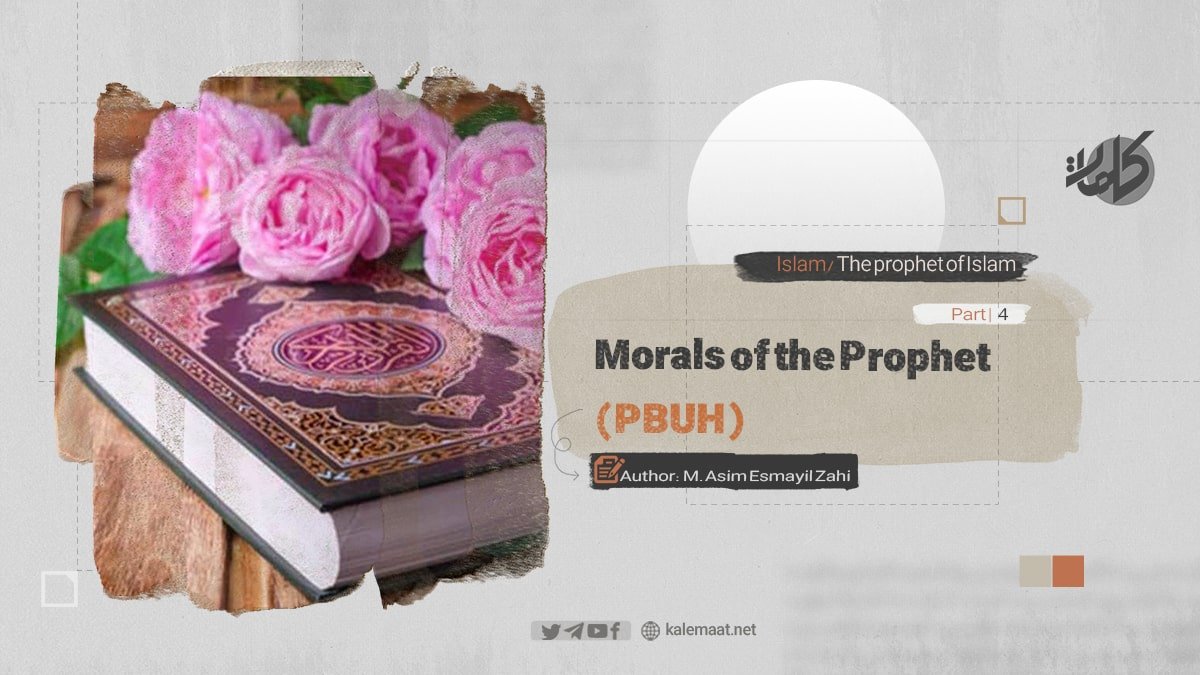
Author: M. Asim Esmayil Zahi
Morals of the Prophet “PBUH” (Part 4)
Manifestations of the Prophet’s Love and Mercy
Almighty Allah has said: «وَمَا أَرْسَلْنَاكَ إِلَّا رَحْمَةً لِلْعَالَمِينَ»; “We have not sent you except as a mercy to the worlds.”
1. The Prophet’s Mercy Towards Muslims
A man migrated from Yemen to the Prophet (peace be upon him) and wanted to participate in jihad. The Prophet (peace be upon him) asked him, “Are your parents in Yemen?” “Yes,” he replied. The Prophet then inquired, “Have you taken permission from them?” “No,” the man said. The Prophet (peace be upon him) advised him, “Go back to your parents and ask their permission. If they allow it, then fight for it, but be kind to them as much as you can, because doing good to parents is the best deed after monotheism.” You can refer to the hadiths that discuss the significance of treating parents well.
2. The Prophet’s mercy towards polytheists
The most prominent characteristic of the Prophet’s moral character is his mercy, compassion and love. The love and sincerity of the Prophet, peace be upon him, was so extensive that the closest family members, companions and friends, and even the captives of the enemy and sinners, were influenced by the love, sincerity, and kindness of the Prophet, peace be upon him. The Holy Qur’an considers the key to the success of the Prophet’s leadership and prophethood to be his sincerity, kindness and compassion. There are hundreds of examples of good and beautiful morals in the practical life of the Prophet, peace be upon him, each of which represents a drop from the vast ocean of his good character. As Allah (S.W.T) explained«وَإِنَّكَ لَعَلَىٰ خُلُقٍ عَظِيمٍ».
“And indeed, you have great and outstanding morals” he mentioned this matter.
Before the battle of Badr, the Prophet, peace be upon him, said to his companions: “I know that some men of Bani Hashem and others have left Makkah by force and have no motivation to fight with us. So if one of you comes across someone from Bani Hashem, do not kill him; And the one who found Aba al-Bahtari son of Hisham son of Haris bin Asad (because he avoided misbehaving with the Prophet, peace be upon him in Makkah, and was one of those who took action to tear up the treaty of Shab Abi Talib), do not kill him; And whoever reached Abbas son of Abd al-Muttalib, do not kill him, because he was forced out of Makkah.
3. The Prophet’s mercy towards children
Because the child is close to the source of nature and has a pure and untainted mind and heart, the child has a very suitable ground for education. He is a divine gift who entered the universe with his simple and clear nature and is far from any ugliness and impurity. It is the child’s parents and educators who, with their incorrect upbringing, divert the path of his pure and divine nature; Therefore, in dealing with a child, one should consider his inherent characteristics. Kindness, caress and affection with a child play an important role in the education and flourishing of his hidden talents.
The Messenger of Allah, peace be upon him, always treated children with love and humility. He paid attention to their natural talents and was deeply offended by their resentment and unhappiness. While hanging out with children, he considered himself to be their equal and played with them and gave orders to others. The Prophet (peace be upon him) would line up the children of his uncle Abbas (Abdullah and Ubaidullah) and say: “Each of them reaches me first, I will give him such and such a thing” and they would compete and sit on the chest of the Prophet (peace be upon him) and the Prophet (peace be upon him) would kiss them and play with them.
Iqrah bin Habes saw the Prophet, peace be upon him, kissing Hassan and said: “I have ten children, and I haven’t kissed any of them until now.” The Prophet (peace be upon him) said: “Has Allah removed kindness from your heart?” Whoever doesn’t show mercy will not be shown mercy.
One of the ways to express the love of parents to their children is to prepare toys and entertainment suitable for their age. Also, when the child asks the parents to play with him, the parents should respond positively to his request but leave the way of managing the game to the child and don’t impose their wishes on him. In addition to giving the child joy and happiness, the game also leads to the development of his hidden talents. The Holy Prophet of Islam, peace be upon him, emphasized this issue, participated in the games of his children and encouraged them to do so by supervising their games.
Religious awareness will play an important role in the child’s destiny if it is provided correctly and in accordance with the needs and mental conditions of the child. Because the basis of a person’s life is his vision and beliefs, and if it is based on solid religious teachings, his life will be divine.
4. The Prophet’s mercy towards animals
The Prophet, peace be upon him, showed great love and mercy towards children, women, and the weak. And he also showed great mercy to animals and commanded the people to be kind to animals.
«اتَّقُوا الله فِي هَذِهِ الْبَهَائِمِ الْمُعْجَمَةِ ارْكَبُوهَا صَالِحَةً وَكُلُوهَا صَالِحَةً».
“As for these speechless cattle, fear Allah (take care of them so that) you ride them well and feed them well.”
Continues…


